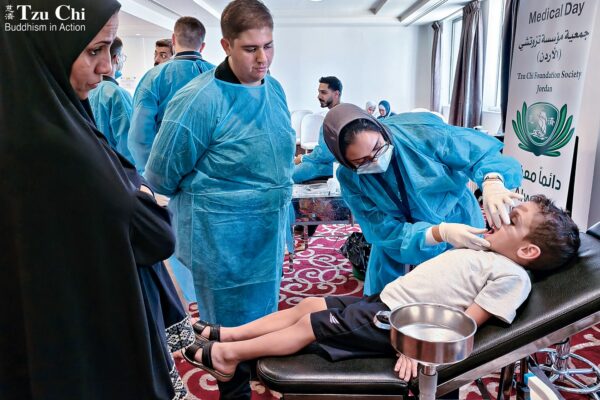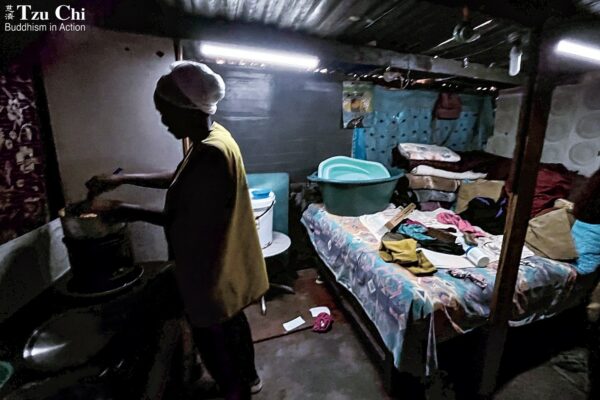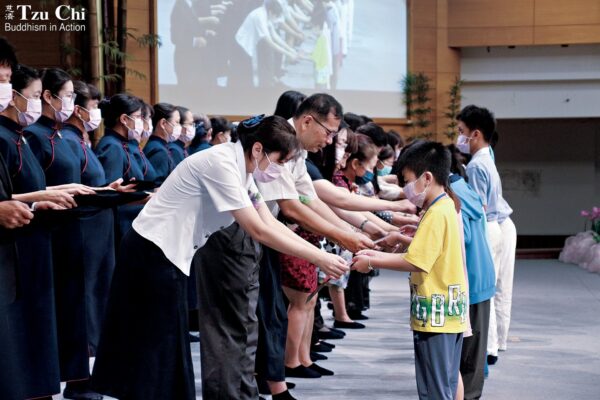By Yeh Tzu-hao
Edited and translated by Wu Hsiao-ting
Photos by Hsiao Yiu-hwa
Tzu Chi started an initiative to increase the coverage rate of assistive devices in remote areas, helping rural people obtain the devices that will improve the quality of their lives.
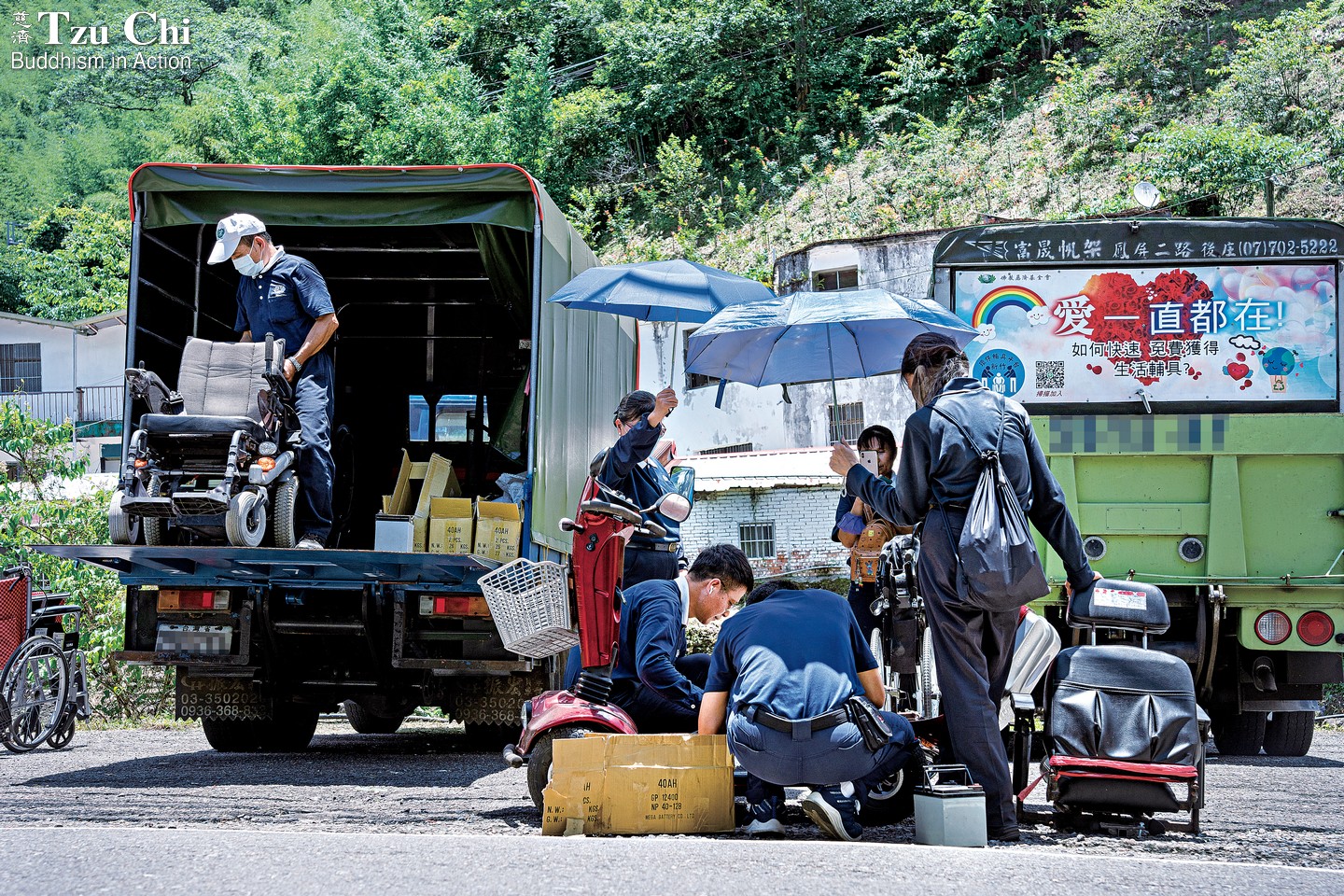
Volunteers unload assistive devices from a truck and give them a final check to make sure they are in proper working order before distributing them in Jianshi Township, Hsinchu County.
Accessing essential medical equipment is straightforward for city dwellers but presents challenges for those in remote countrysides, where obtaining medical help or assistive devices is considerably more difficult. Recognizing these difficulties, Tzu Chi’s free clinic teams have for many years visited remote areas in Taiwan, bringing healthcare services directly to residents. In 2021, the foundation expanded its efforts by collaborating with rural and outlying island township offices to provide assistive devices. In this cooperative endeavor, village officials conduct surveys and register individuals in need, after which volunteers transport the devices to specific locations for distribution.
“Urban residents are generally more informed and can easily apply online or inquire with neighbors if they require assistive devices. However, those in need in remote areas, such as in the mountains, may struggle to find such equipment. Even their neighbors may live far away,” said volunteer Fang Qi-hui (方奇輝), highlighting the disparity in obtaining assistive devices between those living in urban and rural areas.
Tzu Chi’s initiative to enhance the coverage rate of assistive devices in remote areas operates on a township basis. Starting in Taitung, eastern Taiwan, volunteer teams reached out to five townships in the county over the past two years, later expanding to areas including Alishan Township in Chiayi County, Ren’ai Township in Nantou County, and Beigan Township in Lienchiang County (Matsu Islands). Conducting a comprehensive survey for an entire township is comparatively feasible due to the relatively small populations in these far-flung regions. The successful completion of the Jianshi Township Project in July 2023 serves as a typical example of this proactive approach in improving access to assistive devices for elderly and disabled individuals in remote areas.
Jianshi Township Project
Jianshi Township is the largest administrative district in Hsinchu County, northern Taiwan, spanning approximately 528 square kilometers (204 square miles). The township is characterized by towering mountains, with the highest peak reaching over 3,000 meters (9,840 feet), establishing it as a well-known mountainous region in northern Taiwan. The primary residents are the Atayal indigenous people and Hakka. Smangus, located in the township, was the last indigenous tribal settlement in Taiwan to be connected to the electrical power supply. The challenges of remoteness and inconvenience are apparent in Jianshi.
To make it easier for county residents to access subsidies for purchasing assistive devices or to borrow such equipment at no cost, the Hsinchu County government has established an assistive device center in Zhudong Township, centrally located in the county. The social department at the Jianshi Township office assists residents in need of assistive devices with tasks such as filling out forms and submitting them for approval. However, there is a waiting period for the application and approval processes before residents can obtain the devices. Additionally, the township office does not have an immediate inventory of assistive devices for distribution. That’s why Zhang Pei-han (張佩涵), the head of the social department, was delighted when Tzu Chi offered assistance in this area.
“I knew Tzu Chi had an assistive device program,” he said. “After their proactive contact, Mayor Tseng Kuo-ta (曾國大) instructed that we fully cooperate. We immediately surveyed demand through village chiefs and health station personnel.” Zhang shared that a survey in late June 2023 identified over 400 people in need of assistive devices. After a distribution was held to meet their needs, many others inquired, “Can we still apply?”
As a result, a second survey was held, with nearly 200 more people expressing their need for various assistive devices. Tzu Chi organized another distribution in July. In total, over 600 individuals received assistive devices from the foundation, including walking aids, electric mobility scooters, and hospital beds. Considering Jianshi Township’s total population of over 9,000, this effort should have covered the majority of those in need.
Beneficiaries
Mr. Lin, a resident of the Shuitian indigenous community in Jianshi Township, was one of those who received assistance through the distributions. “I had a stroke at the age of 23,” he shared. “It’s been almost eight or nine years now.” He worked in the food and beverage industry before the stroke. Despite being a non-smoker and non-drinker, he faced health issues related to obesity. Standing at a height of 165 centimeters (5’4”), he once weighed over a hundred kilograms (220 pounds). Cardiovascular disease resulting from his weight led to his stroke at a young age.
Lin experienced paralysis on his right side after the stroke and lost the ability to move independently. He persevered through rehabilitation, and began to walk again just over a year ago. Currently weighing just over 70 kilograms, he has made significant progress, but his right leg has not fully regained its function. In order to meet his mobility needs, volunteers provided him with an electric mobility scooter.
“When you release the handle, the scooter will come to a stop,” explained volunteer Fang Qi-hui as he instructed Lin on how to operate the scooter. Fang adjusted the speed control knob to the turtle symbol, starting Lin off at the slowest speed. He then taught him to move forward, backward, and brake before practicing on the road. Volunteers had carefully inspected and made necessary repairs to this second-hand electric scooter before allowing it to be given out. This vehicle would allow Lin to travel effortlessly within a few kilometers from home, making it convenient for shopping or visiting friends.
Another resident in need of an electric mobility aid was Ms. Xu from the Shilei indigenous community. Twenty-seven years ago, she suffered paralysis on the right side of her body due to a traffic accident. When she visited the Shilei Culture and Health Station in July to receive a power wheelchair from Tzu Chi, experienced volunteers immediately noticed that the crutch she was using was too high and promptly adjusted it for her.
Dr. Fan Wen-sheng (范文勝), a member of the Tzu Chi International Medical Association, demonstrated to Xu’s parents how to assist their daughter in hand rehabilitation. He gently pressed on Xu’s right palm and extended her curled fingers. Once he released, her hand returned to its original semi-clenched state. “It’s crucial to exercise both fingers and toes; the earlier you start, the faster the recovery,” he reminded.
“Try moving forward and backward. It’s okay; take your time,” said a volunteer as he guided Xu on how to navigate the wheelchair she had just received. Following the volunteer’s instructions, Xu operated the joystick with her left hand, slowly steering the wheelchair backward. She smiled and raised her left hand to wipe away a tear from the corner of her eye—likely tears of joy. “Don’t be afraid; you’ll get used to driving the wheelchair!” the nearby volunteers encouraged.
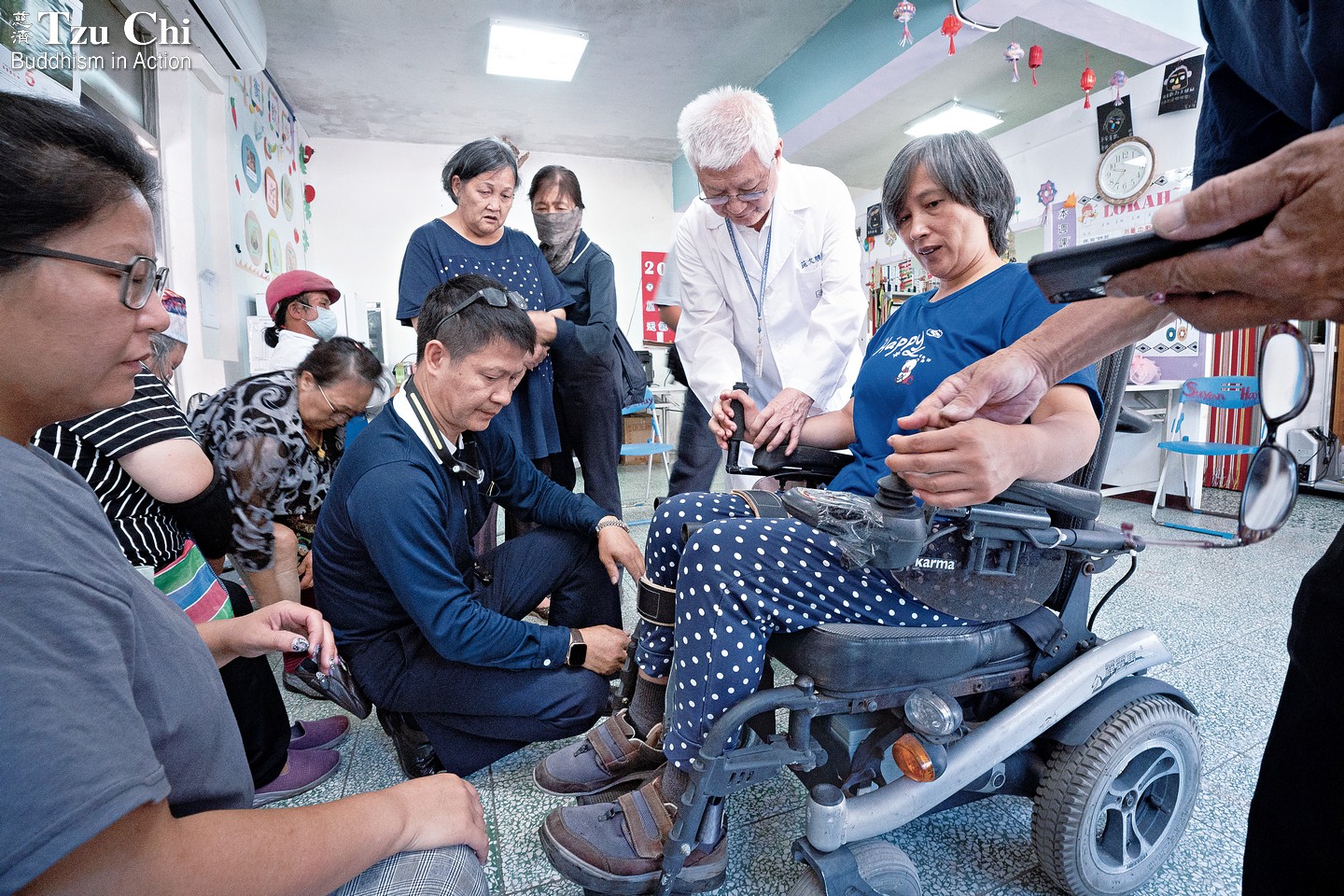
Volunteers patiently show Ms. Xu how to maneuver a power wheelchair, ensuring she feels comfortable and confident in using the device.
Empathetic support
Because communities in Jianshi Township are spread out, volunteers requested that village officials and local health station teams notify registered individuals to collect the requested assistive devices at scheduled times at designated health stations. Volunteers, however, made a point of personally delivering larger items, such as hospital beds, to households, as these were more difficult to transport. Moreover, individuals in need of hospital beds often face greater difficulties with daily activities, even struggling to get in and out of bed. During delivery visits to recipients’ homes, volunteers assessed their needs for additional assistive devices and evaluated whether they should be included in Tzu Chi’s long-term care recipient list.
“He was initially bedridden due to a stroke and unable to walk,” said Huang Li-na (黃麗娜), a caregiver at the Yufeng Culture and Health Station, recounting Mr. Chen’s situation. “A home care worker discovered his condition and applied for long-term care on his behalf. She visited him daily and provided massages. Now he can walk and eat independently.” Recognizing the difficulties Mr. Chen faced in rising from his bed, Huang requested a hospital bed for him from Tzu Chi. Mr. Chen lived with his son and wasn’t fully paralyzed, so Tzu Chi provided a manual bed. While manual beds may lack the convenience of electric ones, they help minimize maintenance issues with electronic components, making them a more suitable choice for people like Chen who resides in a remote area.
The road to Chen’s home, lined by dense bamboo forests, was narrow and winding, with occasional steep slopes. When a Tzu Chi assistive device team delivered the bed to the house and approached the hairpin bend in front of it, they had to accelerate up the slope in their van and truck to eventually reach their destination.
“Don’t grab the height adjustment lever; it’s made of plastic and can break. Hold onto the sturdier bed frame,” cautioned volunteer Xie Ming-zan (謝明讚), guiding Mr. Chen’s son as they maneuvered the bed into the house. Meanwhile, Dr. Fan Wen-sheng provided rehabilitation advice to Mr. Chen: “Regularly exercise your hands to help your fingers become more nimble. Soak them in warm water every day; it will make them more supple.”
Somewhere on their way back after finishing their mission at Mr. Chen’s home, the volunteer team had to pull over and let their truck cool down. The engine temperature was rising sharply. Volunteer Fang Qi-hui remarked, “The mountain roads in Jianshi are indeed pretty steep; driving here requires extra caution.”
Tzu Chi proactively reaches out to remote areas, providing much-needed assistive devices for those facing challenges due to old age, illness, or disability. Alongside this, volunteers offer relevant health education and charitable assistance, alleviating the suffering caused by the lack of medical resources in these areas.

